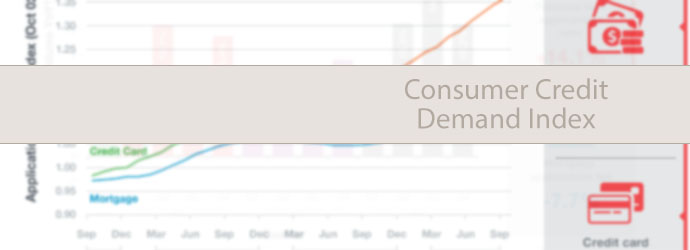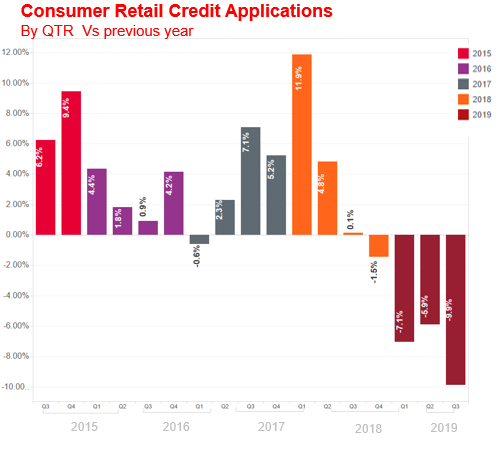Consumer Credit Demand Declines but Mortgage Enquiries Rise
Equifax Quarterly Consumer Credit Demand Index: Sept 2019
Overall consumer credit applications down -9.87% (vs Sept quarter 2018)
Credit card applications declined by -12.41% (vs Sept quarter 2018) and personal loan applications dropped by -7.80% (vs Sept quarter 2018)
Mortgage enquiries increased by +2.01%, the first rise in nine consecutive quarters

Equifax Quarterly Consumer Credit Demand Index: Sept 2019
Overall consumer credit applications down -9.87% (vs Sept quarter 2018)
Credit card applications declined by -12.41% (vs Sept quarter 2018) and personal loan applications dropped by -7.80% (vs Sept quarter 2018)
Mortgage enquiries increased by +2.01%, the first rise in nine consecutive quarters
SYDNEY – November 1, 2019 – Consumer credit demand continues to decline year on year, but mortgage enquiries have increased for the first time since June 2017, according to data from the latest Quarterly Consumer Credit Demand Index (Sept 2019).
Released today by Equifax, the global data, analytics and technology company and the leading provider of credit information and analysis in Australia and New Zealand, the index measures the volume of credit card and personal loan applications. In the September 2019 quarter, credit card applications declined by -12.41% year on year, fuelling the continued drop in overall consumer credit demand.
Personal loan applications also continued a downward trend that began last quarter, dropping by -7.80% when compared to the same time last year. All states and territories declined except for WA.
Moses Samaha, Executive General Manager Customer and Solutions, Equifax said: “The continued decline in applications for credit cards shows they are increasingly less favoured by consumers. Young Australians, in particular, are drawn to Buy Now Pay Later* services.”
Also responsible for the credit card decline: changes to ASIC regulations and the rollout of government reforms, such as restrictions on marketing of credit cards.
The notable drop in personal loan applications is attributed to all loans other than auto loans which remains steady.
Credit card applications dropped in the September quarter. By geography, the largest decline was in ACT (-15.7%), followed by TAS (-13.6%), SA (-12.9%), NSW (-12.8%), VIC (-12.4%), QLD (-12.0%), WA (-11.9%), NT (-11.2%). Decreases have risen over the last quarter.
Personal loans decreased across all states and territories except WA (+4.73%) in the September quarter. The largest decline was seen in ACT (-10.9%), followed by NSW (-8.9%), TAS (-8.3%), VIC (-7.9%), QLD (-7.63%), SA (-7.56%) and NT (-7.38%).
Mortgage demand improved +2.01% for the September quarter, the first uptick after nine consecutive quarters of decline in mortgage applications. VIC (+4.5%), NSW (+3.5%) and ACT (+0.7%) experienced a positive rise year on year. Decreasing trends improved from the June 2019 quarter in all other states and territories.
“The bounce-back in mortgage enquiries after such a long time out in the cold is attributed to growing buyer confidence in the housing market. With two cuts to the Reserve Bank cash rate in the September quarter and ready availability of housing stock, there’s an incentive for people to get back in the game,” Mr Samaha said.
“It’s positive news for mortgage applications across all states and territories, with NSW, ACT and Victoria leading the charge. The other states and territories remained in the negative, but with significant improvements on the previous quarter.”
Historically, movements in Equifax mortgage application demand data has led changes in house prices by around six to nine months. Mortgage applications are not part of the Consumer Credit Demand Index but are a good indicator of home buyer demand and housing turnover.
*Buy Now Pay Later data is not included in the Consumer Credit Demand Index.



ABOUT EQUIFAX
Equifax is a global data analytics company using unique data, innovative analytics, technology and industry expertise to power organisations and individuals around the world by transforming knowledge into insights that help make more informed business and personal decisions.
Headquartered in Atlanta, Ga., Equifax operates or has investments in 24 countries in North America, Central and South America, Europe and the Asia Pacific region, with the acquisition of Veda, a data analytics company and the leading provider of credit information and analysis in Australia and New Zealand. Combined, the companies bring over 170 years of data and insights experience to the marketplace.
Equifax is a member of Standard & Poor's (S&P) 500® Index, and its common stock is traded on the New York Stock Exchange (NYSE) under the symbol EFX. For more information, visit www.equifax.com.au or follow the company’s news on LinkedIn.
NOTE TO EDITORS
The Quarterly Consumer Credit Demand Index by Equifax measures the volume of credit card and personal loan applications that go through the Equifax Consumer Credit Bureau by financial services credit providers in Australia. Credit applications represent an intention by consumers to acquire credit and in turn spend; therefore, the index is a lead indicator. This differs to other market measures published by the RBA which measure credit provided by financial institutions (i.e. balances outstanding).
DISCLAIMER
Purpose of Equifax media releases:
The information in this release does not constitute legal, accounting or other professional financial advice. The information may change, and Equifax does not guarantee its currency or accuracy. To the extent permitted by law, Equifax specifically excludes all liability or responsibility for any loss or damage arising out of reliance on information in this release and the data in this report, including any consequential or indirect loss, loss of profit, loss of revenue or loss of business opportunity.
Related Posts

Mortgage demand hits four-year high as a second consecutive quarter of double-digit growth for credit cards is observed and most prominent among younger Gen Z’s.

The latest Equifax Business Market Pulse for Q4 2025 reveals a multi-speed recovery. Large businesses are leading the way on credit demand growth, with an observed increase in overall demand reaching heights of up to +19.4% (trade credit) in some sectors, such as hospitality.
